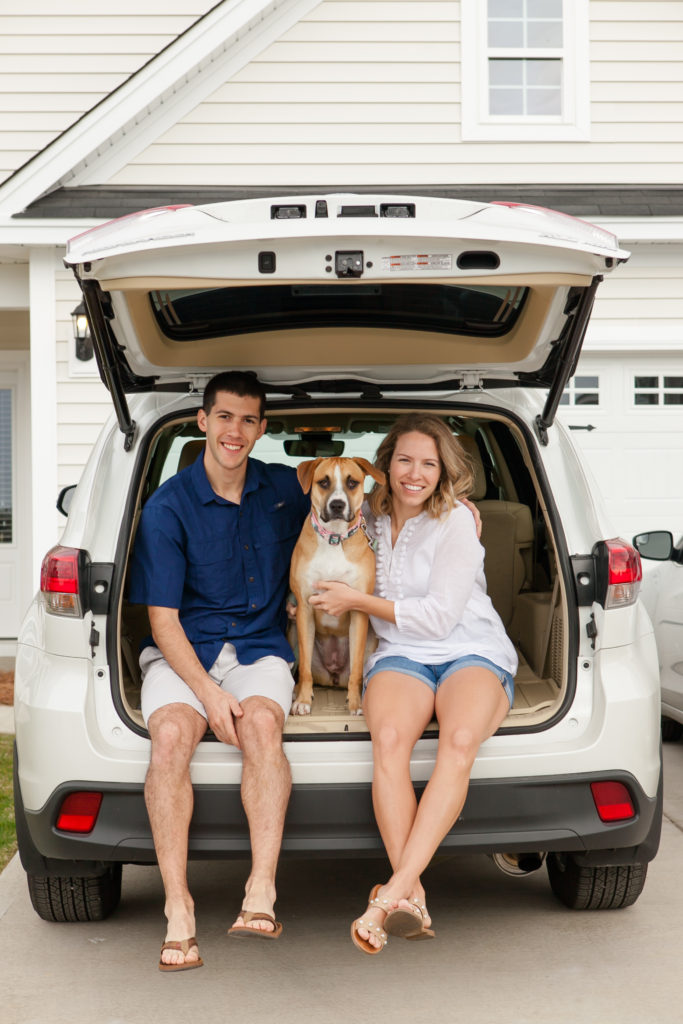April 3, 2018
 A couple of months ago Dave Ramsey shared one of my posts that I had shared on Instagram about us paying off our new car. It brought a lot of you here which I’m so incredibly thankful for and it also brought along a lot of questions, the most popular of them all – How did we do it? Today Stephen and I are sitting down and answering that question for you. In the next post, we’ll be sharing tips about how you can do that yourself.
A couple of months ago Dave Ramsey shared one of my posts that I had shared on Instagram about us paying off our new car. It brought a lot of you here which I’m so incredibly thankful for and it also brought along a lot of questions, the most popular of them all – How did we do it? Today Stephen and I are sitting down and answering that question for you. In the next post, we’ll be sharing tips about how you can do that yourself.
Before we get into this, we do want to mention that we are going to give you as much information as possible but the one thing we’re not disclosing is our income. There might be some criticism that comes along with our decision but it’s just something we want to keep private and we believe we can provide advice on this without having to share that number.
Let’s start with the facts:
- Car we purchased: Toyota Highlander XLE (you can read about why we ultimately chose to purchase the Highlander here)
- Car’s name: Carol Lee
- Amount we purchased the car for: $40,300 (including tax)
- Interest rate: ~2.75%
- Date of purchase: August 25, 2017
- Date we paid it off: February 12, 2018
- Time it took for us to pay it off: 5 months and 18 days
Now for the good stuff… How did we do it?
2-3 years before we purchased the car:
We saved up before we went to the dealership.
I (Jordan) started saving up for a new car the day I started my “big girl job” in 2016. I knew that my little ol’ car was going to start causing me serious problems so I started putting chunks of my paycheck into savings towards a car. To make things even clearer – I didn’t have any debt during this time (I’ll get more into this in another post about debt). In fact, I had never had debt until we purchased the Highlander in August. So my paychecks (I worked two jobs at this time) were going towards my overly expensive apartment, food, gas, utilities, tithe, and extra spending money. Anything that was leftover went into savings.
Stephen was also saving up during this time. He had just paid his own car off and was also debt free so any money he had remaining at the end of the month was going into savings. Coming into marriage, we had a good chunk saved up for a new car.
Day of purchase:
We ended up putting 37% down on the car – $15,000 to be exact.
At the time when we purchased the car, only Jordan had heard of Dave Ramsey. We didn’t really know how he felt about new cars or what he thought about debt, etc. We didn’t really know much about him at all. All we really knew was that he was a famous money guy. At this point, we didn’t consider a car payment as “debt”. We considered it to be the equivalent of a rent check with “some” interest tacked onto it. We looked at our income and our expenses and based on that number, we figured out what we were able to afford for our monthly payment… Just like we would’ve done if we were paying rent every month.
Since we weren’t complete fools and knew the interest would bite us in the butt, we still knew that we wanted to pay the car off before the four year loan period. Anything remaining on our paychecks went towards the car for the first couple months.
To break down the amount of interest we would’ve paid over 4 years:
With $15,000 down at a rate of about 2.75%, we would’ve paid an extra $1,500 by the time it was all said and done. It might not seem like a lot but imagine what you can do with $1500… For us we’re thinking… CRUISE!
Two-ish months after purchasing the car:
We got gazelle intense about it.
We started listening to the Dave Ramsey podcast on our first big road trip in Carol Lee on our Grand Canyon adventure and our entire perspective changed. We even got to the point where we discussed selling our brand spankin’ new Carol Lee for a used, less expensive car. Our mindset changed from a “rent payment” to “we’ve got debt and we need to get rid of it NOW”. We realized that the money that we were putting towards the car every month could be money in our accounts to spend on other things like trips, home projects/décor, whatever we wanted to spend it on. We didn’t want to OWE ANYONE A SINGLE PENNY.
Now, at that point Dave Ramsey would’ve said we had ~$22,000 in debt and that we should work the baby steps to pay it off.
Here are the baby steps in case you’re new to these –
- Baby Step #1 – Save up $1000 for an emergency fund. We already had this done.
- Baby Step #2 — Pay off the debt using the debt snowball (list your debts from smallest to largest and attack the smallest debt first while making minimum payments on the other debts).
- Baby Step #3 – Save up 3-6 months of expenses. We already had this done.
- Baby Step #4 – Invest 15% of income into retirement. We were doing this.
- Baby Step #5 – Save up for children’s college.
- Baby Step #6 – Pay off the house.
- Baby Step #7 – Build wealth and give.
To clarify, before we bought the car, we were on baby step #4. Once we purchased the car, we were on baby step #2 since we had debt at that point.
What Dave would’ve said to do:
This debt was the only one on our list since it’s all we had. Dave would say at this point that we should:
- Temporarily stop putting 15% towards retirement until our debt was paid off.
- Take everything from our savings except for the $1000 emergency fund and put it towards the debt.
What we did:
We did not do that. We want to always remain honest on here with you all so we do want to make it clear that we did not follow the baby steps perfectly. The reason why? As for the investing in retirement part, we don’t think we even really talked about that actually. When we started this “debt free journey” we didn’t even know everything involved with the baby steps. But after we had listened to the podcast for a few months, we realized that’s what we should’ve done. By that time we were almost done paying the car off anyway so we just let it go. As for our savings… We were terrified to give up our fully funded emergency fund with 3-6 months living expenses. This was especially heightened considering we were closing on a new house in 5 months and don’t use credit cards as safety nets. This also is something we can write an entire blog post about… A car loan and then a house a few months after? DUMB. Don’t do it. But since we were already committed (like we said, all of this happened before we learned about Dave Ramsey), we had to figure out the smartest way to get ourselves out of this mess. Here’s what we did:
- A decent down payment.
- We put a large chunk of our savings towards the car. We didn’t put all of it down to the $1000 emergency fund but we did put $7000 towards it. Once again, being transparent…
- We took all of our extra money at the end of the month and put it towards the car. This one was HUGE for us. The way to maximize this number? Create a budget.
- Stephen had a small savings account (about $2,000) that he never touched from when he worked during college. We took all of the money out of that and threw it at the debt. This was the last payment to get us over the finish line.
- We got really intense about getting this thing paid off. We were scrappy about it! We wanted it to be done ASAP so we pushed our limits with our savings despite the house and really put anything we could find towards the car.
A few key points we want to make:
- As you can probably tell from this post, the large down payment and saving up for years before purchasing the car helped a ton for us. However, we really really want to stress that even though we got our car paid off this way, we will never do it again! The payment part, that is. Ultimately, the goal should be to NEVER HAVE A CAR PAYMENT. If we could go back in time and do this all over again, we would’ve either bought a $25,000 used car or waited another 6 months to walk into the Toyota dealership and paid cash for a $40,000 car. Most likely it would’ve been the former.
- Buying a car is usually not an emergency. This applies to both used or new. Like Jordan said, her car started causing her problems. It wasn’t like one day the thing just quit working entirely, thankfully. There’s really no excuse to say “ah, my car is going bad so I need to get this brand new one.” No, if you don’t have the money to buy a brand new car with cash, you shouldn’t be buying one. Make do by getting an inexpensive option that will get you from point A to point B while you save up for your brand new car (if you must have new).
- We’ll most likely never buy a new car again unless we’re millionaires. The next car that we purchase will be a 2-3-year-old used car.
If you currently have a car payment and want to get out of debt, this is what we suggest doing:
- Think of a car payment as debt and not as another payment such as rent. Once you have the mentality that it’s debt, the hope is that you attack it with gazelle intensity. Or better yet! Write down all of the things you’d do with the extra $___ amount of money in your account every month. Maybe you’d use that money to plan for a vacation or use that money to pay for a new couch with cash. Whatever you want! Just write them down, visualize where your money COULD be going, and start attacking the debt! Get fired up about it! It’s so important that this mentality change happens. You need to feel fed up and fired up!
- Start listening to Dave Ramsey’s podcast. We both listen to it daily. I (Jordan) actually realized that I start to slack off when I don’t listen to it for a while so I try to listen to it during at least one of my commutes. Stephen listens to it to and from work daily. It’s really inspiring to hear other people’s stories and to realize you CAN do it!
- The total of your cars should be less than half of your annual income. If it’s not, seriously consider selling your car (or carS!) for a less expensive option. Like we mentioned above, start listening to Dave’s podcast. You’ll hear him walk callers through this scenario every single day. Ours fit into this equation which is why we decided to just buckle down and get it paid off fast. If it didn’t, however, we can both agree that we would’ve sold it and paid cash for a used one instead.
- Follow the baby steps to a T. Like we said, we didn’t and looking back, not only should we just have bought a less expensive car but we also should’ve followed the baby steps to a T! The car would’ve been paid off even sooner but we made multiple dumb mistakes before we learned about Dave (we purchased our house while we had the car debt which is a big no-no) and didn’t want us to be in an even bigger mess so here’s our message to you — follow the baby steps strictly.
- START A BUDGET. Download the Every Dollar app and sit down and write a budget out every month. Know where every single penny you make is going. Every Dollar should have a purpose.
- Increase your income. Work an extra job (or two!) or pick up more hours. That was a huge reason we were able to put so much down on the car to begin with. This all goes back to being fed up and fired up or as Dave says, “sick and tired of being sick and tired.”
- If you’re irresponsible with credit cards, get rid of them. NOW! They are NOT a safety net and never should be treated as such.
We’re sorry this post was so long! We even have more that we could say but we’re going to leave it at that for now. Please let us know if you have any questions! You can reach us in the comments below, on Instagram or at jordanjeanblog@gmail.com. We hope you all have an awesome day!
(and Stephen)
To pin for later:

jordan jean
Leave a Reply


[…] debt you put anything in your savings except for $1000 and throw it at the debt. If you’ve read this post, you know that we did not do that because we had way too many potentials to pop up around that time […]
[…] talked about how we paid off our new car here but there’s so much more we can say about our thoughts on money. So before we dive into budgeting […]